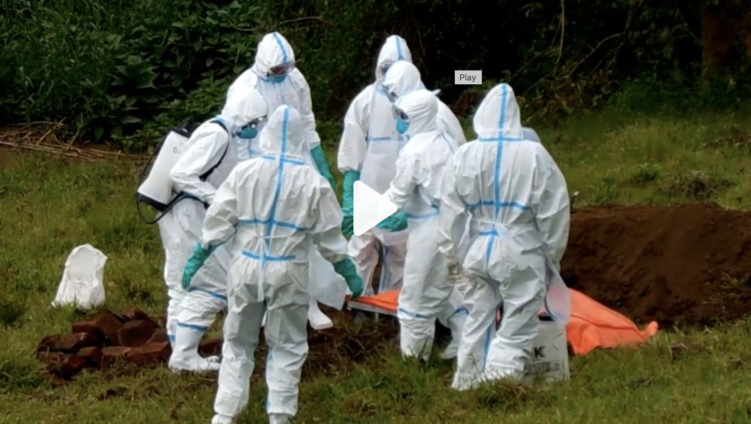Ugandan President Yoweri Museveni has declared an immediate three-week lockdown in two high-risk districts as the country battles a rise in Ebola infections.
All movement in and out of the Mubende and Kassanda districts will be halted, Museveni said in a televised address on Saturday – although cargo trucks will be allowed to enter and leave the areas.
Curfews will also be imposed. Places of worship, bars, gyms, saunas and other entertainment venues will close but schools will remain open, he added.
“Given the gravity of the problem and to prevent further spread and protect lives and livelihoods, the government is taking extra measures that require action from all of us,” Museveni said.
The Ugandan health ministry will also increase contact tracing and assistance to local health facilities.
Ebola is a rare but deadly disease. It spreads through direct contact with body fluids and is not transmitted through airborne viral particles, the US Centers for Disease Control and Prevention (CDC) says.
It has no cure, and there is no approved vaccine, although there is a concerted effort to create one.
Speaking at a media briefing earlier this month, World Health Organisation Director-General Tedros Adhanom Ghebreyesus said the vaccines used successfully to curb recent Ebola outbreaks in the Democratic Republic of the Congo are not effective against the type of Ebola virus now circulating in Uganda.
“However, several vaccines are in various stages of development against this virus, two of which could begin clinical trials in Uganda in the coming weeks, pending regulatory and ethics approvals from the Ugandan government,” said Tedros.
Uganda has experienced four Ebola outbreaks. The deadliest left more than 200 people dead in 2000.
Museveni declared an Ebola outbreak in September after a case of the relatively rare Sudan strain was confirmed and cases began to rise across districts.
The latest outbreak has so far killed 29 amid 63 recorded cases.
According to the CDC, a person infected with Ebola “is not contagious until symptoms appear (including fever, headache, muscle and joint pain, fatigue, loss of appetite, gastrointestinal symptoms, and unexplained bleeding).”
The virus spreads through direct contact with body fluids and is not transmitted through airborne viral particles, the CDC says.
Latest Stories
-
Ɔdadeɛ Y2K group marks 25th anniversary with sustainable kitchen project at PRESEC
8 minutes -
New ECG board can ensure improvement – IPP Boss
18 minutes -
Our DCE is not involved in galamsey – Asaman Tamfoe Chief and residents defend Ernest Owusu Ntim
21 minutes -
Spare parts dealers instructed to slash prices to reflect cedi gains
49 minutes -
Ɔdadeɛ Y2K group highlights key projects to mark 25th anniversary
55 minutes -
Cedi Appreciation: “Gold for oil” not the same as “Gold for reserves”
59 minutes -
Reform Ghana school feeding programme – Eduwatch tells Gender Minister
1 hour -
Omane Boamah leads Ghana to join Burkina Faso in honoring Sankara and Rawlings at historic memorial ceremony
4 hours -
I was 20 when I played for Ghana’s U-17 team – Charles Taylor
6 hours -
JoySports Editor Fentuo Tahiru launches Tumu Community Cup set for May 24
6 hours -
Joseph Taylor breaks Ghana’s 29-Year 400m national record with sub-45s run
6 hours -
Greater Accra public lands: Government to set up Commission of Inquiry
7 hours -
Cleanliness to be used for measuring performance of MMDCEs – Mahama
7 hours -
You are now a beacon of hope – Nungua Mantse to President Mahama
7 hours -
‘Smart formalisation’ holds the answer to Africa’s problems – Bawumia
7 hours

